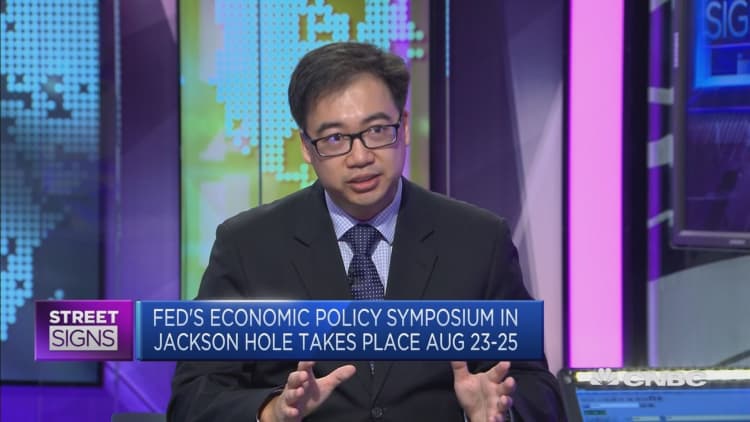U.S. government debt yields fell to session lows on Monday after President Donald Trump scorned the Federal Reserve's decision to raise interest rates.
Trump told Reuters he was "not thrilled" with Fed Chair Jerome Powell for the bumps to the federal funds rate, saying that "I should be given some help by the Fed." He said he would criticize the Fed if it continues to the elevate the cost of borrowing.
The central bank's latest meeting minutes are scheduled for release Wednesday while Powell is set to speak Friday. Fed officials are expected to hold high-level discussions about policy and the economy while in Wyoming, with some market watchers hypothesizing that the central bank could debate changing its policy on its balance sheet.
The yield on the benchmark 10-year Treasury note fell 5 basis points to 2.819 percent at 4:28 p.m. ET, while the yield on the 30-year Treasury bond also lost 5 basis points to hover at 2.984 percent. Bond yields move inversely to prices.
Treasurys
"We've heard from presidents in the past say they want more accommodation but to comment on the next policy from the Fed is unusual," said Lindsey Piegza, chief economist at Stifel Nicolaus. "These are very specific comments that are intended to be left to policy experts ... These types of comments could be perceived to threaten the autonomy of the Federal Reserve."
It is uncommon for presidents to explicitly criticize Fed chairmen, who are supposed to be independent. But Trump has already done so in an interview on CNBC earlier this summer.
"I think what we're seeing here is a president who is accustomed to talking about a whole wide range of issues, whatever happens to be front and center, whatever happens to be at the front of his mind," added Nathan Sheets, chief economist at PGIM Fixed Income.
A strong job market and healthy economic growth have kept the Fed on its course for continued rate hikes in 2018. Central bankers have been increasing rates off historic lows a decade after it flushed the financial system with money to help it recover from the financial crisis. The Fed has long-telegraphed its intention to raise rates back to a neutral level.
The Federal Open Market Committee has voted to raise rates five times since Trump's inauguration and is expected to hike them twice more through December 2018.
"For the Fed, they're at a place where the labor market is well stronger than neutral and the interest rate is still well below neutral," he added. "The Fed needs — by any theory of central banking — to move the rate back to neutral. There are many more risks if they fail to do that."
With little major economic data due out Monday, investors in the bond market will be turning their attention to the political space.
On Thursday, White House economic advisor Larry Kudlow confirmed to CNBC earlier reports that China and the U.S. would hold a fresh round of trade discussions later this month.
A day later, markets ticked higher following news reported by The Wall Street Journal that a nine-member delegation from Beijing would hold meetings with officials from the States later this week. The report added that this could lead to a potential meeting between the presidents of the two countries in November. While the latest news has buoyed markets, investors remain cautious.

The U.S. Treasury is set to auction $51 billion in 13-week bills and $45 billion in 26-week bills. The size of a four-week bill, due to be auctioned Tuesday, will also be announced.



